Hungry for help: refugees in Kenya feel the effects of recent food cuts
KAKUMA REFUGEE CAMP, Kenya, January 9 (UNHCR) – Nyachot squints up at the midday sun above Kakuma Camp as she stirs the daily meal for her family. Before last November, the 34-year-old South Sudanese refugee could cook twice a day. But when the World Food Programme cut rations by 50 per cent that month, she feared for her children’s future.
“The food does not even last the two weeks that it should,” Nyachot told UNHCR visitors, turning to gaze at her baby son. Like thousands of other women at this camp in north-west Kenya, she relies completely on the rations she receives, in the absence of any other source of income. Full rations were later resumed on January 1, but the situation remains serious and fresh funding is needed to avert the risk of further cuts in the future.
Nyachot fled South Sudan in February last year, after fighting intensified between government forces and rebels. Desperate to save her children, she embarked upon an arduous weeklong journey that took her from her home in Maiwat, Upper Nile state to Nadapal, the border entry point to Kenya.
Her eyes filled with tears as she recalled the trauma. “I travelled by boat with about 40 other people for five long days to Juba and then took a bus from there to Nadapal,” she said. “My children were hungry and thirsty.”
When they finally arrived in Nadapal, UNHCR officials and other humanitarian agencies were there to greet them with energy biscuits and water. Later, at Kakuma’s reception centre, they received hot meals, sleeping bags and a place to sleep, before being transferred to Kakuma 4, the new settlement area for South Sudanese arrivals.
For Nyachot, finding refuge in Kakuma and receiving food assistance was a huge relief. Non-food items, such as blankets, cooking utensils, an energy stove and jerry cans, were also supplied and helped her family settle into their new home. But with the food ration cuts in November, Nyachot’s concern quickly began to grow.
In one of the nearby mud houses, Stephen and Gawar shared similar worries. They fled Pangak in South Sudan’s Jonglei state and, like Nyachot, sought refuge in Kakuma. “The situation is very bad,” observed Stephen, interviewed before full rations were resumed last week. “We eat once a day and the food can get finished after five days. Some of our people are even thinking of going back home. It is not an ideal solution, but people are desperate.”
Nyagai, their 36-year-old neighbour, concurred. “Once the rations run out, I survive by begging for food from my neighbours,” she says. “It is a shame to do so but what option do I have?”
Her friend, Nyapel, smiled sadly when she revealed that she could not breastfeed her 11-month-old son due to a medical condition. “I have to sell part of my meagre rations so as to buy milk for him. If I don’t this, then my son will not survive.”
After the ration cuts took effect in November, concerted efforts were made by World Food Programme to raise additional funding and restore full rations – and this was possible at the start of the month. But the funding situation remains uncertain and WFP and UNHCR have issued joint appeals to donors for help.
Meanwhile, UNHCR and partner NGOs continued to engage with refugees through their community leaders to assure them of continued support during November and December. These efforts were a result of the recent joint Inter-Agency Regional Appeal for the South Sudan Emergency Response.
Although refugees had been assured that this was a temporary situation, they remain concerned. “If the food cuts continue, many people will suffer, especially the elderly, the women and children,” said Gawar. Stephen believed that their hope lies with UNHCR.
As she turned back to her cooking, a glimmer of hope flickered in Nyachot’s eyes. She, at least, believed that things would get better; if not for her then at least for her children.
Page 12 of 18
-
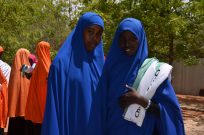
Refugee School Girls Attend 2017 Girls’ Conference
11 Oct 2017This years’ theme for the Day of the Girl, EmPOWER Girls: Before, during and after crises, fits perfectly with the Conference which aims at exposing the girls to practical classic solutions to girl child education amidst the many barriers faced by refugee school girls in the Dadaab context.
-

Refugee athletes have competed at Asian Games
20 Sep 2017“I have learnt a lot from the Asia games because it is my first time to participate in international games and am happy that I qualified for the finals.”
-
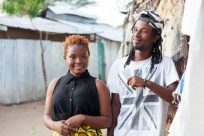
Through Our Eyes: Emerging refugee film makers tell their stories
11 Sep 2017The film ‘It Has Killed My Mother’ has been nominated for awards in 5 categories in the 2017 Slum Film Festival Kenya. The film is inspired by real life experiences as explained by Aminah, the script writer.
-
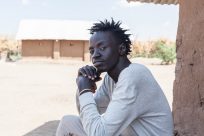
Transforming Youth Talent into Livelihoods
10 Sep 2017“Through the project, I have learnt that my music is my medium to a better life. My dream is to become a filmmaker in future but if this dream doesn’t materialize, I know my music will take me far.”
-
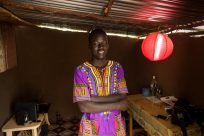
24 Refugee Students Receive DAFI Education Scholarships
8 Sep 2017“Higher education access for the growing number of secondary school leavers remains minimal with less than one (1) percent of eligible youth in the camp benefiting.”
-

Music careers enhanced through Artists for Refugees Project
6 Sep 2017“The Refugeenius album is a celebration of human wealth and the innovation and entrepreneurship spirit we see among refugees in all the camps.”
-
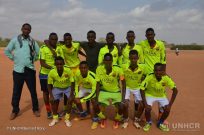
What a Game: Refugee teams Battle it Out in Dadaab
5 Sep 2017‘We have talented players in the camp who, if nurtured and given a chance can easily be scouted by teams in La Liga and the English Premier League.’
-
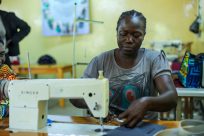
“Mifuko Project”: Value Addition for Refugee Produced Bags
31 Aug 2017The project will facilitate production of 250 bags by December 2017 that will be sold in the local and international market with support from Lutheran World Federation.
-
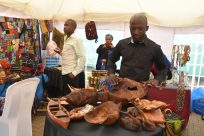
Market Opportunities Open Up For Refugee Entrepreneurs
29 Aug 2017He has been living in Kenya since 2000 after fleeing war in his country. The only thing he carried with him was skill in making sculptures.
-
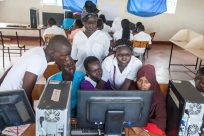
Refugee girls in Kakuma camp attend ICT Bootcamp
22 Aug 2017“The Bootcamp not only offers much needed and marketable skills, it also empowers the trainees and builds their confidence and self-esteem in ICT. Some now see technology as a gateway to future career prospects.”
